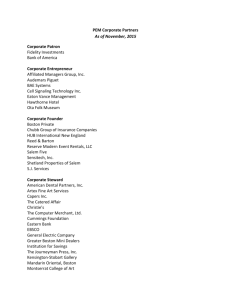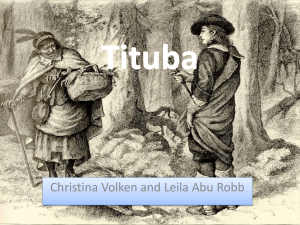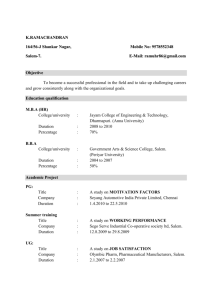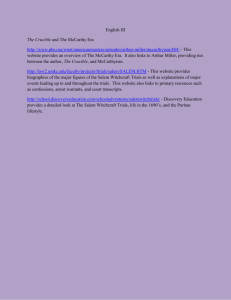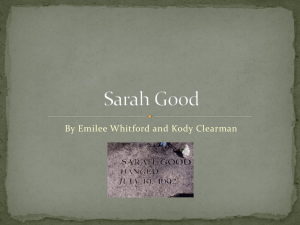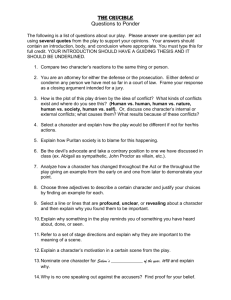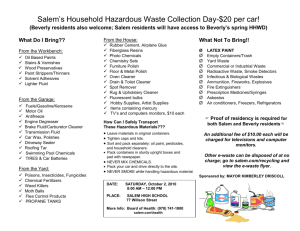Creative Writing Project: Writing Trains Grant Proposal
advertisement
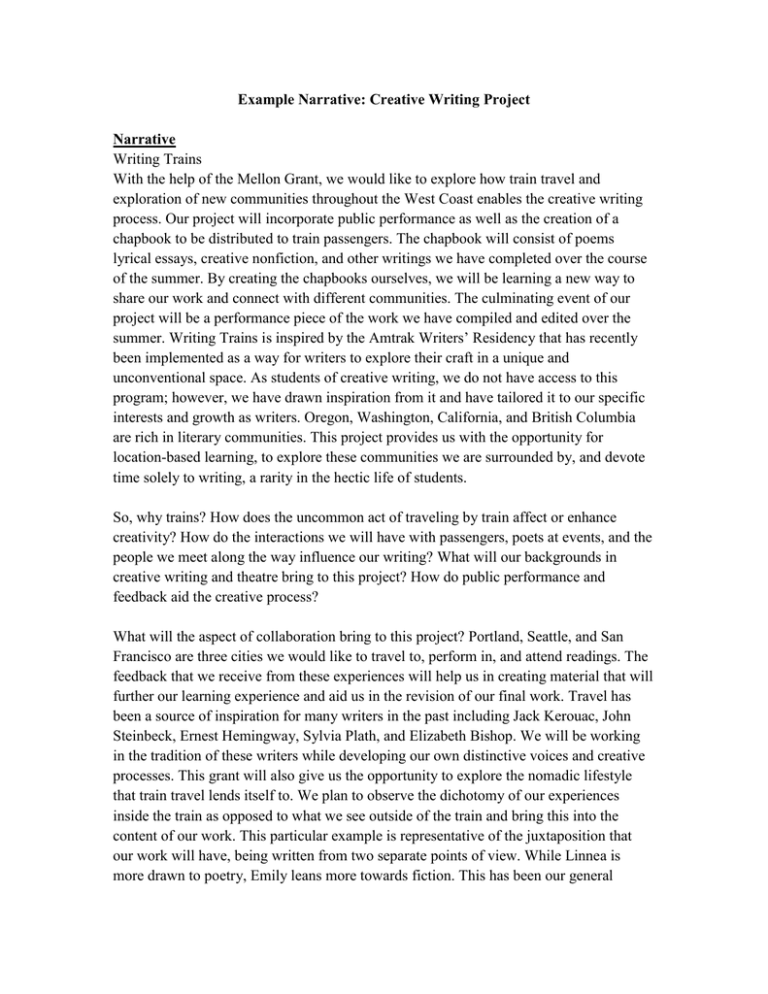
Example Narrative: Creative Writing Project Narrative Writing Trains With the help of the Mellon Grant, we would like to explore how train travel and exploration of new communities throughout the West Coast enables the creative writing process. Our project will incorporate public performance as well as the creation of a chapbook to be distributed to train passengers. The chapbook will consist of poems lyrical essays, creative nonfiction, and other writings we have completed over the course of the summer. By creating the chapbooks ourselves, we will be learning a new way to share our work and connect with different communities. The culminating event of our project will be a performance piece of the work we have compiled and edited over the summer. Writing Trains is inspired by the Amtrak Writers’ Residency that has recently been implemented as a way for writers to explore their craft in a unique and unconventional space. As students of creative writing, we do not have access to this program; however, we have drawn inspiration from it and have tailored it to our specific interests and growth as writers. Oregon, Washington, California, and British Columbia are rich in literary communities. This project provides us with the opportunity for location-based learning, to explore these communities we are surrounded by, and devote time solely to writing, a rarity in the hectic life of students. So, why trains? How does the uncommon act of traveling by train affect or enhance creativity? How do the interactions we will have with passengers, poets at events, and the people we meet along the way influence our writing? What will our backgrounds in creative writing and theatre bring to this project? How do public performance and feedback aid the creative process? What will the aspect of collaboration bring to this project? Portland, Seattle, and San Francisco are three cities we would like to travel to, perform in, and attend readings. The feedback that we receive from these experiences will help us in creating material that will further our learning experience and aid us in the revision of our final work. Travel has been a source of inspiration for many writers in the past including Jack Kerouac, John Steinbeck, Ernest Hemingway, Sylvia Plath, and Elizabeth Bishop. We will be working in the tradition of these writers while developing our own distinctive voices and creative processes. This grant will also give us the opportunity to explore the nomadic lifestyle that train travel lends itself to. We plan to observe the dichotomy of our experiences inside the train as opposed to what we see outside of the train and bring this into the content of our work. This particular example is representative of the juxtaposition that our work will have, being written from two separate points of view. While Linnea is more drawn to poetry, Emily leans more towards fiction. This has been our general writing pattern, and we’re both interested in crossing forms to explore formats such as the lyric essay and creative non-fiction, as well as experimenting with shape and physical appearance of text on the page. We will split our time between riding trains and regrouping in Salem to edit our work, create chapbooks, and prepare for our final presentation. Returning to Salem provides a concrete home base, which we view to be equally important as the act of travel in our process. While we are in Salem, we will focus our efforts towards reading books from our reading list, and printing and crafting our chapbooks. Specifically, the content of the chapbook will center on interactions, experiences, and inspiration gathered from visiting these literary communities. An example of such content would be a poem that explores moving through new areas and the transitory population of train travel. The act of sharing these chapbooks with the people we meet on trains as well as the Willamette Community will serve as a way to give back to a wider community than Willamette, and will give our project a broader scope of influence. One of the most enticing aspects of the Learning by Creating Grant is the opportunity it presents for collaboration. By working together, we will learn from one another. We work extremely well together and are very excited to explore the spontaneity that comes from collaboration, as well as the sense of adventure that helps inspiration to grow. However, we both work differently, and our contrasting thought processes and writing styles will enhance our learning experience. The time spent on trains will be devoted to writing, collaborating, and connecting with the community found on the trains and cities we visit. Traveling to these literary communities and centers will provide us with a plethora of raw material that will ultimately shape our final product. Our final culminating piece will be tentatively performed in the Putnam black box space in the M. Lee Pelton theatre building, and will incorporate elements of spoken word poetry, monologues, prose, dialogue, movement, and storytelling. The presentation will be based on the collaborative work we have completed over the course of the summer, the cities we have visited, people we have met, and trains we have ridden. ALL ABOARD! Challenges/Obstacles: Travel fatigue Quick turn around Short time spent in each place Differences in style, artistic background Disciplinary differences (creative writing, theatre) Building a presentation that shares both our individual voices, as well as our collaborative voices Writers block Logistics Reading maps effectively Planning trips in a successful manner Obtaining lodging Splitting work equally Time management Safety Theft, personal belongings Objectives Understand how train travel affects the creative process Learn how our collaborative travel companionship enhances the creative work we produce. How we can incorporate the feedback we receive into our final product/ presentation Learn how to craft and subsequently print and create approximately 100 chapbooks by the end of the summer. Record passengers’ reactions to receiving chapbooks. Keep separate daily journals to record experience Create a final performance piece that will resonate with our audience (students, professors, Salem community) emotionally and academically. How can we most accurately display our experiences through writing? How will the mixture of creative writing and performance come together to create a presentation that fully encompasses what we have experienced? How does the performance of a written piece change its meaning or impact? How does movement manifest itself in the expression of our work? Devise a performance piece that incorporates images from our travels, movement, and our own spoken word fiction and poetry. Timeline Week 1: Travel Week Day 1: Prepare for upcoming trip, meet with advisor to work out any questions or concerns. Day 2: Leave for Portland Trip time: 1 hr 30 mins writing Day 3: Explore Portland by public transportation, attend any readings or poetry slams. Day 4: Leave for Seattle Trip time: 4 hrs writing Days 4-7: Attend readings, slams in Seattle area Week 2: Travel Week, Salem Day 1: Leave for BC Trip time: 4 hours writing Days 1-4: Attend readings/slams, get feedback on work Day 5: Leave for Salem Trip time: 9 hours writing Days 6-7: Regroup in Salem, edit work collaboratively. Discuss experiences so far, decide if methods of creating are efficient/working well. Week 3: Travel Week, Salem Days 1-3: Meet with Advisor, get feedback on work we have created thus far (aiming for 10-15 pieces) Revise accordingly. Day 4: Leave for Portland 1 hr 30 mins writing Attend museums, Saturday Market Leave for Salem 1hr 30 mins writing: Recap experiences of day, edit work Days 5-7: Prepare for upcoming trip Week 4: Travel Week Day 1: Leave for Eugene: Trip time: 1 hr 30 writing Days 1-2: Attend readings, slams in Eugene Day 3: Leave for Northern California Trip time: 14 hours spent writing Days 4-7: Attend Slams in Berkeley, Santa Rosa Week 5: Travel Week, Salem Day 1: Leave for San Francisco Trip time: 3 hrs spent writing Days 1-4: attend readings, slams in SF Day 5: Leave for Salem Trip time: 19 hours writing Days 6-7: Revise work, begin designing chapbook (Have at least 30 pieces). Begin devising performance. Week 6: Salem Day 1: Meet with Advisor, discuss project so far, what still needs to be done, concerns etc… Days 2-6: Work on finalizing work and creating chapbooks. Continue devising performance - push focus towards final piece. Day 7: Finish Chapbooks. (At least 40 final pieces). Week 7: Salem Day 1: Leave for Portland: Distribute chapbooks and record reactions. Day 2: Back to Salem Days 3-7: Finalize devised performance piece Week 8: Salem Days 1-7: Rehearse final performance Meet with Advisor to assess the finished product!
